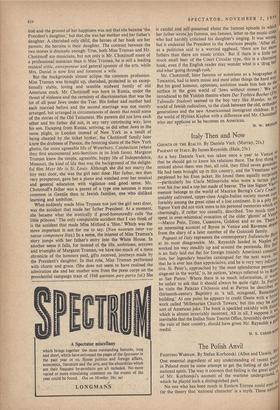Italy Then and Now
GHOSTS OF THE RIALTO. By Daniele Vare. (Murray, 21S.) PAGEANT OF ITALY. By James Reynolds. (Hale, 25s.) As a boy Daniele Vare was taken once a year to Venice s: that he should get to know his relations there. The first thing he noticed about them was that, all told, they filled seven gondolas; He had been brought up in this country, and the Venetians vier perplexed by his Eton jacket. He found them equally surprisil —particularly his Uncle Milosevichs who wore a tartan P18,11 over his frac and a top hat made of beaver. The late Signor Vat.' memoir belongs to the world of Maurice Baring's Cat's Cradle: amiably cultivated, upper-class Anglo-Italian society moves coal; fortably among the great cities of a lost continent. It is a pity thee Signor Vert did not stick more to his personal memories which at charmingly, if rather too casually, described. Too much time '5 spent in over-whimsical evocation of the older 'ghosts' of Venicie 0 —Marco Polo, Titian, Casanova, Goldoni and so on. There ' an interesting account of Byron in Venice and Ravenna drayl"„ from the diary of a later member of the Guiccioli family.e Pageant of Italy represents the contemporary ltalienische Rei'd at its most disagreeable. Mr. Reynolds landed in Naples anly worked his way steadily up and around the peninsula. His lie is an Italy laid out flat for foreign (mainly American) consul; tion, her legendary beauties catalogued for the next wave. 14 that he is ever less than appreciative, and he is very very informal tive. St. Peter's, approached by 'the most splendorous permarie0 stage-set in the world,' is, he notices, 'always referred to in Road as San Pietro.' Where there is so much information, it Olio be unfair to ask that it should always be quite right. In Ferrak0 he visits the Palazzo Chifanoia and at Parma he describes the thirteenth-century Baptistry as 'a tall, octagonal, Renaissarl$1 building.' At one point he appears to credit Dante with a 1Yric0 work called 'Millenarian Church Towers,' but this may be so,0 sort of American joke. The book is speckled rakishly with t, which is almost invariably incorrect. All in all, I suppose it vii; inevitable that the Italian State Tourist Office, feverishly devoted Id the ruin of their country, should have given Mr. Reynolds a g° medal. D. S. CARNE--R055


































 Previous page
Previous page